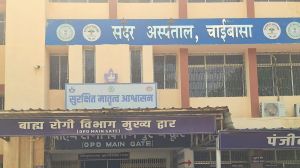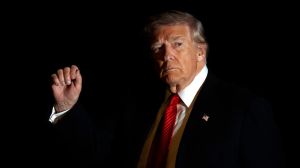8216;8216;There are vivid memories of a lot of music played in the house, lot of records stored on the shelves...8217;8217;
Born on Octo...

8216;8216;There are vivid memories of a lot of music played in the house, lot of records stored on the shelves8230;8217;8217;
Born on October 11, 1942, in Allahabad, Amitabh is said to have been a promising student, artistic and above average, obedient in the classroom and energetic in the playground. In his early years, he attended St Mary8217;s Convent, and then Boys8217; High School, where his younger brother Ajitabh joined him. From the very beginning, he was inclined towards theatre.
The brothers learnt early on to respect their father8217;s privacy. Dr Harivansh Rai Bachchan was a professor at Allahabad University and spent his spare time writing. Mother Teji compensated for her husband8217;s busy schedule. After Amitabh completed school 8212; from Sherwood College, Nainital 8212; the family shifted to Delhi as Dr Bachchan joined the Ministry of External Affairs. For a while, Amitabh studied in the Government College, Chandigarh, later shifting to Kirorimal College.
Teji Bachchan and her husband had accepted early on that one day, the kids would take wings and fly. After graduation, Amitabh took up his first job with Bird 038; Co in Calcutta; his brother followed him after completing his studies. For close to six years, Amitabh lived the busy life of an executive, but there was a restlessness that refused to be subdued. It was Ajitabh who helped give shape to his unspoken desires by bringing home an application form for films. It was Ajitabh again who clicked photos of his brother and sent then off to Bombay. The eternally pessimistic Amitabh didn8217;t expect a reply, and it didn8217;t come; he had been rejected in the preliminaries. But by now, his mind was set on Bombay.
|
COLLEAGUES ON BACHCHAN 8226; For someone as busy as him, his thoughtfulness keeps surprising me. Jaya Bachchan wife 8226; He was awesome on screen, yet there was no sign of that image when he was with the family. Abhishek Bachchan son 8226; His intensity is touching even though he8217;s hardly the kind to display his vulnerability. Zeenat Aman co-star Story continues below this ad 8226; He never gives himself away in a rehearsal. You never know what8217;s coming in the final take. Rekha co-star 8226; Hindi cinema will remember me as Amitabh8217;s mother. In a way, his success has made me immortal. Nirupa Roy screen mother 8226; I was used to success, but Bachchan8217;s presence in Bade Miyan Chote Miyan, lent me a new status and an added responsibility. David Dhawan director BACHCHAN ON BACHCHAN 8226; I8217;d say that my best attribute is my instinct8230; acting should be like music8230; words must have a rhythm. Story continues below this ad 8226; The kind of adulation, fan-following and autograph-hunting I have seen with my father, I have yet to see for myself. 8226; I8217;m unconfident all the time. I8217;m the biggest pessimist you could have ever met. 8226; Marriage is a union of two individuals and the profession they pursue is secondary8230; For me, marriage means a lifetime association. 8226; There8217;s no extravagance in our house8230; I don8217;t think we have given our kids the impression there8217;s excess money. Story continues below this ad 8226; Friendships and relationships are areas I8217;d like to keep to myself. Talking about them destroys the very essence. 8226; Every time I do something, it runs into controversy. So what do I do? Shut up and sit at home? I prefer to get on with my life instead8230; They made a controversy even out of my beard. 8226; I8217;m surprised and shocked and find it a little difficult being grouped with Lawrence Olivier, Charlie Chaplin and the rest. |
8216;8216;I was allowed to follow my instinct. As a family, we always had the freedom and the healthy spirit of respecting each others8217; opinions8230;8217;8217;
First, the parents had to be informed in Delhi, then a secure job had to be given up. But it wasn8217;t long before K A Abbas spotted him and cast him in Saat Hindustani. The year was 1969 and, going by the rave reviews he received, Amitabh expected to be besieged by offers. But as the months went by, the dream turned into a nightmare. Too sensitive to seek financial aid from home and too proud to reveal his desperation, he spent anguished days and hungry nights, often sleeping on the Marine Drive parapet.
Filmmaker Hrishikesh Mukherjee picked him up for Guddi, but when he learnt that he was already acting in a South film called Pyar Ki Kahani, replaced him with a newcomer, Samit Bhanja. But the tall, dark newcomer had obviously made an impression 8212; Mukherjee later cast him in the Rajesh Khanna starrer, Anand. The year was 1970. Unanimously appreciated for his quiet performance, Amitabh should have found a take-off point in Anand. But the 11 films that followed all bombed 8212; Parwana, Pyar Ki Kahani, Reshma aur Shera, Bombay Talkies where he worked as an extra, Bansi Birju, Bombay To Goa, Ek Nazar, Raaste Ka Pathar, Sanjog, Garam Masala, a guest appearance and finally Bandhe Haath.
The jinx ended with Prakash Mehra8217;s Zanjeer in 1973, a turning point in his career and his life. He married to co-star Jaya Bhaduri and a year later, daughter Shweta was born. The angry young man persona endured for over a decade, even as filmmakers tried to give him different identities: complex in Hrishikesh Mukherjee films, romantic in Yash Chopra8217;s, dramatic in Prakash Mehra8217;s and entertaining in Manmohan Desai8217;s. His ascendant stars coincided with the decline of the then 8216;Phenomenon8217; Rajesh Khanna. Gradually came a time when the crown ceased to be in dispute.
8216;8216;My work would be obsolete in a few years8217; time, but my father8217;s work will go on for centuries8230;8217;8217;
It was too good to last. The bubble burst in the cruellest way possible, when a mistimed punch from 8216;villain8217; Puneet Issar during the shooting of Manmohan Desai8217;s Coolie ruptured the superstar8217;s intestines. The nation went into shock, even as tickets for Ravi Tandon8217;s Khuddaar, then playing in the cinemas, sold for astronomical rates in the black market. Amitabh was hospitalised for six months, and the entire country prayed for his recovery. It is a debt he has acknowledged, and has tried seriously to repay.
The accident also compelled the media, which had banned the actor during his heydays, to climb down from their high horse. The generosity, though temporary, was moving nevertheless.
Like it happens in his films, the hero recovered miraculously. The superstar, his glory magnified by the forced hiatus, resumed shooting from the very shot in which he had been injured, and when the film made it to the cinemas, a freeze-frame reminded the legions of fans what they come close to losing. Coolie ran for 75 weeks, and marked 50 weeks in every centre.
The next turning point in the superstar8217;s life came with Indira Gandhi8217;s assassination. Childhood friend Rajiv Gandhi was distraught and sought people he trusted around him. Amitabh contested the Lok Sabha elections from Allahabad and won a thumping victory. But the silverscreen hero, a reluctant politician at best, had no appetite for the cesspool of corruption and gave it all up to return to his creative muse.
But with the exception of K Bhagyaraj8217;s Aakhri Raasta 1986, the going proved tough. The complacency of the old guard showed in films like Ganga Jamuna Saraswati, Jaadugar and Toofan.
8216;8216;People change, attitudes change, but basics don8217;t alter and that8217;s important8230;8217;8217;
The icon needed re-inventing and the whiz-kid who finally waved the magic wand was Mukul Anand. Agneepath, 1990, was followed by Hum and Khuda Gawah. The trilogy ended in tragedy when Mukul Anand died suddenly.
Around this time, Bachchan lifted his ban on the press. Not to tell his side of the story, but to let bygones be bygones. The media, initially suspicious and therefore hesitant, eventually surrendered to the truce. But all the kiss-and-make-up act served to prove was that the media cannot make or mar a star: Bachchan8217;s career peaked without them, and the entire tribe put together could not salvage Ajooba, Indrajeet, Akayla and Insaaniyat.
After Khuda Gawah in 1992, Bachchan took a sabbatical to 8216;8216;review my career8217;8217;. It seemed like a reasonable argument: The actor hadn8217;t had a break since 1973, when Zanjeer became a hit, and later 1982, after the accident. Filmmakers and writers visited him with proposals and returned empty-handed, but Bachchan had something big brewing: TV Asia, and then AB Corp. It was the best thing to happen to him, also the worst.
The enterprise focused as sharply on his assets as his weaknesses. He trusted too many and too easily. After the Bofors scandal, the 1996 Miss World contest in Bangalore saw Bachchan embroiled in his second big controversy.
The dark clouds multiplied when his comeback film, Mrityudaata, bombed at the box-office. His maiden audio album Eir Bir Phate was ridiculed and his endorsement of BPL and Mirinda universally condemned. Absorbing it all like a sponge, the lone ranger continued with his assignments, some good Sooryavansham, some bad Lal Badshah and some controversial Major Saab. Alongside, he set the trends: Staging musical shows a la Michael Jackson, lending his voice for film scores, and of course, hosting Kaun Banega Crorepati, a television game show.
Recently voted Star of the Millennium in an on-line BBC opinion poll, when the actor completes three decades before the arclights 8212; and six decades on earth 8212; on Friday, he will be the only one of his contemporaries to continue to play protagonist Aks, Aankhen, Kaante and command his market price.
8220;It8217;s important in life to get off the tread mill once in a while and look at yourself8230;8221;
Bhawana Somaaya is the editor of Screen weekly.
- 01
- 02
- 03
- 04
- 05































